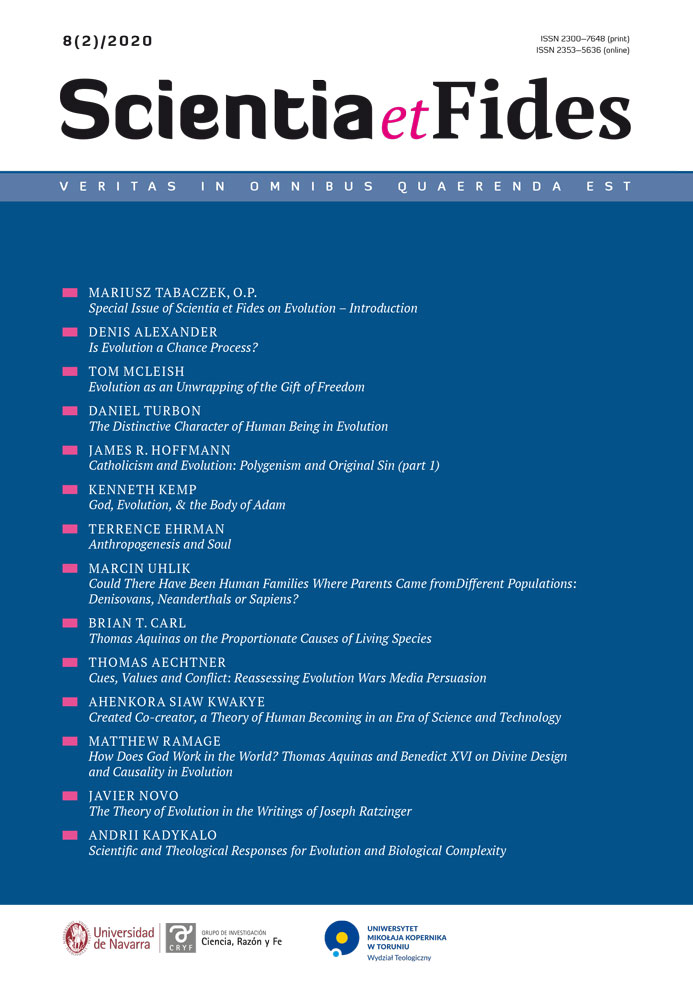Scientific and Theological Responses for Evolution and Biological Complexity
DOI:
https://doi.org/10.12775/SetF.2020.025Keywords
teleology, randomness, organism, metaphysical assumptionsAbstract
The article analyzes aspects of the relationship between evolution and biological complexity and the attempts made by scholars and theologians to interpret it within the limits of reductionist scientism or theism. For this purpose, firstly, attention is focused on explaining the meaning of the concept of "evolution" and its historical and philosophical transformation in the context of the idea of complexity. Secondly, the notion of complexity in theology is used as evidence to support teleology. This approach is criticized by some scholars who consider evolution as a random prosses. They give it the status of a universal metaphysical assumption in evolution. The scientists and theologists both formulate metaphysical assumptions differently to interpret evolution.
References
Alex, Bridget. 2018. “The Human Brain Evolved to Believe in Gods.” Discover. October 15. https://www.discovermagazine.com/planet-earth/the-human-brain-evolved-to-believe-in-gods#.XbB0EyjVJdg.
Allen, Colin, and Jacob Neal. 1996. “Teleological Notions in Biology.” Stanford Encyclopedia of Philosophy. https://plato.stanford.edu/entries/teleology-biology/
Augustine, Saint (Bishop of Hippo). 1876. The Confessions. Translated and annotated by Joseph G. Pilkington. Edinburg: T.&T. Clark.
Augustine, Saint. 2018. The City of God. Abridged Study Edition. Introduction and translation William Babcock. New York: New City Press.
Ayala, F. Jose. 2019. “Evolution Scientific Theory.” Evolution. Encyclopædia Britannica. https://www.britannica.com/science/evolution-scientific-theory/The-science-of-evolution
Barbour, G. Ian. 1990. Religion in an Age of Science. New York: Harper Collins Publishers.
Barbour, G. Ian. 1997. Religion and Science: Historical and Contemporary Issues. New York: Harper Collins Publishers.
Behe, J. Michael. 2006. Darwin`s Black Box: The Biochemical Challenge to Evolution. New York London Toronto Sydney: FREE PRESS.
Berry, John Anthony. 2017. „What makes us human? Augustine on interiority, exteriority and the self.” Scientia et Fides 5(2): 87–106.
Collins, C. John. 2003. Science and Faith: Friends or Foes? Wheaton: Crossway Books.
Davies, Paul. 2004. The Cosmic Blueprint. Philadelphia and London: Templeton Foundation Press.
Dawkins, Richard. 2006. The Blind Watchmaker. London: Penguin.
Dembski, A. William. 1992. “Intelligent Design is not Optimal Design.” https://www.discovery.org/a/86/.
Edelstein, Ludwig. 1944. “Aristotle and the Concept of Evolution.” The Classical Weekly 37: 148–150.
Futuyma, Douglas. 2013. Evolution. Sunderland, MA: Sinauer Associates.
Ginsborg, Hannah. 2015. „Two Kinds of Mechanical Inexplicability in Kant and Aristotle.” The Normativity of Nature: Essays on Kant's Critique of Judgement. Oxford Scholarship Online.
Herron, C. Jon, and Scott Freeman . 2013. Evolutionary analysis. London: Pearson.
Junker, Reinhard, and Siegfried Scherer. 2002. Evolucija ili Stvaranje. Belgrade: Preporod.
Kolb, Daniel. 1992. „Kant, teleology, and evolution.” Synthese 91: 9–28.
Küng, Hans. 2007. The Beginning of All Things: Science and Religion. Translated by John Bowden. Grand Rapids Cambridge: William B. Eerdmans Publishing Company.
Mainzer, Klaus. 2015. “Exploring Complexity: Von Artificial Life und Artificial Intelligence zu Cyberphysical Systems.” In Exploring Cybernetics, edited by Sabina Jeschke, Robert Schmitt, Alicia Dröge, 185–212. Wiesbaden: Springer.
Maynard, J. Smith. 1969. “The status of neo-Darwinism.” In Towards a theoretical biology, vol 2: sketches, editor by Waddington C. H., 82–89. Edinburgh: Edinburgh University Press. 1969.
Millstein, L. Roberta. 2017. “Evolution”. Stanford Encyclopedia of Philosophy. https://plato.stanford.edu/entries/evolution/.
Monod, Jacques. 1972. Chance and Necessity: An Essay on the Natural Philosophy of Modern Biology. Translated by Austryn Wainhouse. New York: Vintage Books A Division of Random House.
National Association of Biology Teachers (NABT). 2008. “Statement on Teaching Evolution”. https://ncse.ngo/national-association-biology-teachers-2000.
Palomar College. 2012. “Pre-Darwinian Theories.” https://www2.palomar.edu/anthro/evolve/evolve_1.htm.
Plato. Complete Works. 1997. Edited by John M. Cooper, D. S. Hutchinson. Indianapolis/Cambridge: Hackett Publishing.
Poli, Riccardo, and Cristopher R. Stephens. 2014. “Taming the Complexity of Natural and Artifical Evolutionary Dynamics.” In Evolution, Complexity and Artificial Life, editors by Stefano Cagnoni, Marco Mirolli, Marco Villani, 19–42. Heidelberg New York Dordrecht London: Springer Publishing Company.
Polkinghorn, C. John. 1988. Science and Creation: The Search for Understanding. London, SPCK.
Polkinghorn, C. John. 1991. Reason and Reality: The Relationship Between Science and Theology. Salem: Trinity Pr Intl; 1st edition.
Polkinghorne, C. John. 1994. Science and Christian Belief: Theological Reflections of a Bottom-up Thinker. London: SPCK Publishing.
Rosen, Robert. 1987. “Some epistemological issues in physics and biology.” In Quantum Implications: Essays in Honour of David Bohm, 314–327, edited by Basil Hiley and F. David Peat. London: Routledge & Kegan Paul.
Smedt, De Johan, and Helen de Cruz. 2020. The Challenge of Evolution to Religion. Cambridge: Cambridge University Press.
Strumilowski Ocist, P. Jan. 2019. „Complementarity and cohesion of the sophiologic and scientific vision of creation.” Scientia et Fides 7(1): 207–25.
Tatarkiewicz, Władysław. 1999. Historia filozofii. T.2. Filozofia nowożytna do 1830 roku. Warszawa: Wydawnictwo Naukowe PWN.
Downloads
Published
How to Cite
Issue
Section
License
Copyright (c) 2020 Scientia et Fides

This work is licensed under a Creative Commons Attribution-NoDerivatives 4.0 International License.
CC BY ND 4.0. The Creator/Contributor is the Licensor, who grants the Licensee a non-exclusive license to use the Work on the fields indicated in the License Agreement.
- The Licensor grants the Licensee a non-exclusive license to use the Work/related rights item specified in § 1 within the following fields: a) recording of Work/related rights item; b) reproduction (multiplication) of Work/related rights item in print and digital technology (e-book, audiobook); c) placing the copies of the multiplied Work/related rights item on the market; d) entering the Work/related rights item to computer memory; e) distribution of the work in electronic version in the open access form on the basis of Creative Commons license (CC BY-ND 3.0) via the digital platform of the Nicolaus Copernicus University Press and file repository of the Nicolaus Copernicus University.
- Usage of the recorded Work by the Licensee within the above fields is not restricted by time, numbers or territory.
- The Licensor grants the license for the Work/related rights item to the Licensee free of charge and for an unspecified period of time.
FULL TEXT License Agreement
Stats
Number of views and downloads: 731
Number of citations: 0



